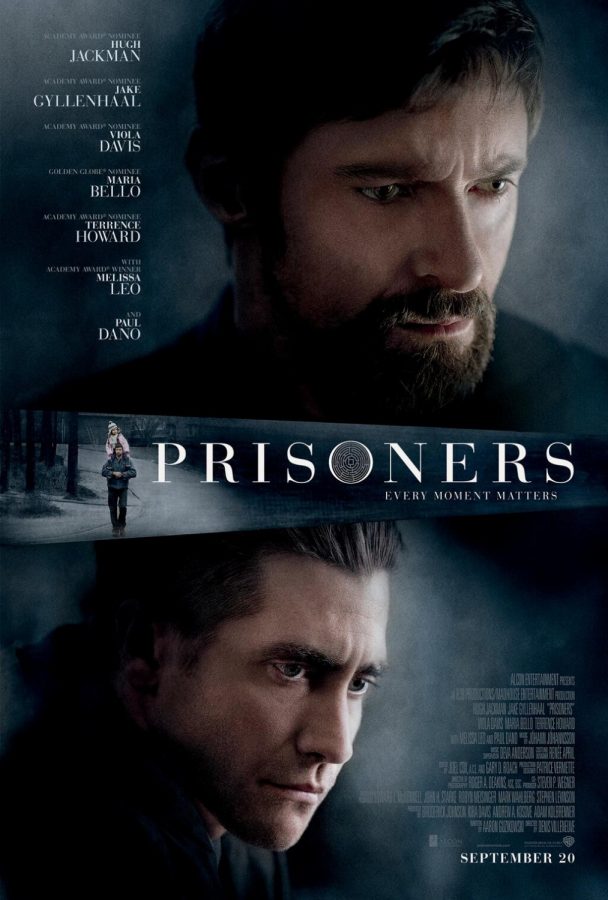‘Prisoners’ offers fierce performances and ethical mediations
“Prisoners” is a thrilling drama that shows how far a father will go to protect his family.
September 23, 2013
There are more than a few questions “Prisoners” wants its audience to consider. It wants to know what ethical lines could be crossed to save a child. It challenges the audience to condemn a desperate father. It wonders when and how virtues become vices. Director Denis Villeneuve and screenwriter Aaron Guzikowski's taut story brings torture and vigilante justice into the home. In the suburbs of Pittsburgh, a storm of morals becomes lost in snow and rain. When Keller and Grace Dover (Hugh Jackman and Maria Bello) and Franklin and Nancy Birch (Terrance Howard and Viola Davis) share Thanksgiving, their daughters disappear after an ominous camper shows up.
Detective Loki (Jake Gyllenhaal) tracks the van to Alex Jones (Paul Dano). But after discovering Jones has the mentality of a 10-year-old, Loki lets him go to Jones' reserved Aunt Holly (Melissa Leo) in favor of other leads. But Keller isn't convinced of Jones’ innocence. He abducts and tortures Jones in ways that would make a Guantanamo Bay guard blush.
"Prisoners" pits the obsessive and impulsive Keller against the rational and calm detective Loki. As a paranoid family man, Keller keeps a basement of lye, gas masks and food rations and follows the motto, "Pray for the best. Prepare for the worst." Loki, marked by tattoos and a flawless detective record, spends his Thanksgiving alone in a Chinese restaurant. Their relationship is defined by confrontation, both considering the other ineffective or bothersome to the case. Without sermonizing, Villeneuve never fully condemns or confirms either position. Instead, he shows how a dark situation could grow darker.
The blemishes are minor. A two-and-a-half-hour run time pushes a story into unnecessary moments. A lack of subtlety forces repeated lines, drawn-out ethical dilemmas and a heavy-handed title. Instead of a slow descent into depravity, the Keller story is weakened by his immediate, irrational emotion that's already willing to jump his ethical fence. This makes the Loki story more engaging. Contrasting Keller, the detective slowly loses control as the investigation drags on.
Additionally, the film borrows conventions that, if handled by a less skilled cast and crew, could have been more distracting. The biggest shortcoming is not what the film is, but what it could have been. At times, it plays out like a Fincher film without Fincher. It wants to explore murky morality, but it holds back from exploring too far.
What’s most interesting are the Christian overtones. Villeneuve is no stranger to Christian themes. In his last film, the Academy Award nominated "Incendies," the Christian themes are integral to the story. Here, the Christian elements' importance are moot but nonetheless prevalent and almost relevant to the plot. Crucifixes are everywhere and characters openly pray. The film opens up with "The Lord's Prayer," which contrasts with a later, compelling moment when Keller recites it again but cannot pray to forgive his enemies. But apart from this notable scene, the religious tones are used mostly as a McGuffin and as a mark to show Keller’s descent from his Christian moral.
The obsession also draws Keller to spend most of this day away from his family. His wife spends most of the day heavily medicated and it bed while his son is left oblivious to his actions. After being nine years sober, Keller starts drinking again, raising even more concerns in his household. The film becomes not a crisis of faith but of family too. In this light, it is a nuanced look at how the loss of one affects the other.
"Prisoners" grips and excites. The performances are powerful. Twists keep the ending unpredictable. Editors Joel Cox and Gary Roach, frequent collaborators with Clint Eastwood, keep an ominous pacing while Rodger Deakins (“Skyfall”) supplies his dazzling photography. As a detective film, it uses red herrings and startling implications to unwind a maze of mystery with mastery. As an unflinching look at crushing evil, it gives a grisly look into the horrors of corruption.







